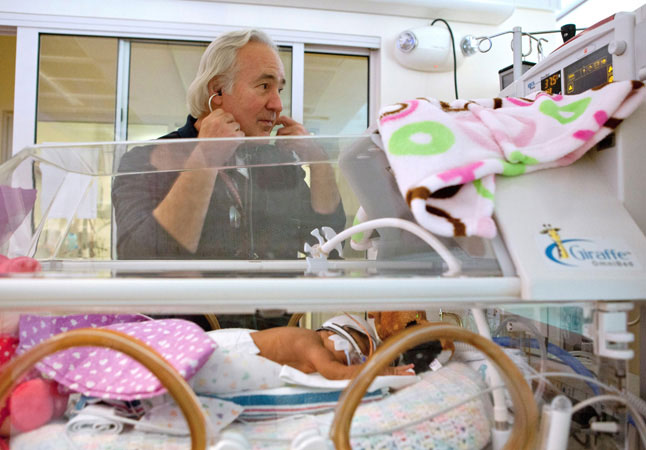Neonatology Pioneer at Lucile Packard Children's Hospital Stanford and Stanford Medicine Children’s Health Honored With Major National Award
Physician-scientist and outstanding role model has dedicated his career to improving the lives of the smallest and sickest babies

For Release: Mar. 7, 2016
STANFORD, Calif. — David K. Stevenson, MD, renowned neonatology leader at Lucile Packard Children’s Hospital Stanford and professor of pediatrics at the Stanford University School of Medicine, has been named recipient of the 2016 Joseph W. St. Geme Jr. Leadership Award by The Federation of Pediatric Organizations.
Stevenson will be presented the award on April 30 at the Pediatric Academic Societies Meeting in Baltimore.
This prestigious award was created in the memory of St. Geme, who was a leader in addressing issues concerning the future of pediatric education and research. It recognizes a pediatrician who is an outstanding role model as a clinician, educator and/or investigator. Recipients have a record of broad and sustained contributions to pediatrics that have had or will have a major impact on child health. Most importantly, the award recognizes those individuals who have “created a future” within the field.
Nominating Stevenson were pulmonologist Hugh O’Brodovich MD, the Adalyn Jay Physician-in-Chief at Packard Children's and professor of pediatrics at the Stanford University School of Medicine, and Donna Ferriero, MD, MS, professor of pediatrics and of neurology, chair of pediatrics, and physician-in-chief at UCSF Benioff Children's Hospital San Francisco.
“Dr. Stevenson is an outstanding role model who has made remarkable contributions in clinical care, education and research,” said O’Brodovich. “During Dr. Stevenson’s long and remarkable career, he has greatly advanced the care of premature infants, been an influential leader in education, and worked tirelessly toward discovering the causes of premature birth in conjunction with the March of Dimes.” As principal investigator of the March of Dimes Prematurity Research Center at Stanford University, Stevenson leads the center's work to understand preterm birth.
Stevenson, who has dedicated his career to improving the lives of the smallest and sickest babies, said he is honored and humbled to be the beneficiary of the award, especially knowing that St. Geme received his undergraduate and medical degrees from Stanford University.
“We were both beneficiaries of Stanford’s environment, which creates opportunities for students where they can take intellectual risks and not be afraid to fail,” he said. “It’s a culture that is conducive to innovation and discovery, and I wouldn’t be the leader I am today without my relationships with the students and the faculty members I have worked with. This award reflects their success as much as my own.”
Few could match Stevenson’s long and storied career as a leader in care, research and education. He received a B.A. in philosophy from Stanford, earned his M.D. and completed pediatric residency training at the University of Washington School Of Medicine, and then returned to Stanford for a fellowship in neonatal-perinatal medicine. In 1979, he joined Stanford’s faculty and became professor of pediatrics by 1990. Stevenson, who has held several leadership positions at Stanford, now serves as director of the Charles B. and Ann L. Johnson Center for Pregnancy and Newborn Services at Lucile Packard Children's Hospital Stanford and Stanford Children’s Health, senior associate dean for maternal & child health at the School of Medicine, and co-director of the university’s Child Health Research Institute.
His seminal studies on neonatal jaundice, bilirubin production and heme oxygenase have changed practice in neonatal intensive care units and have set the stage for future approaches for the management of newborn jaundice. His work has appeared in more than 600 publications and led to new technologies, including helping to pioneer the first optical imaging of structure and function in living mammals using time-of-flight absorbance imaging.
His list of honors and achievements includes the Virginia Apgar Award, the highest award in Perinatal Pediatrics in 2006. He has also received the Maureen Andrew Mentor Award from the Society for Pediatric Research, and the Jonas Salk Award for Leadership in Prematurity Prevention from the March of Dimes Foundation. In 2012, he was elected to the Institute of Medicine of the National Academy of Sciences.
He is a member and has served in leadership positions in numerous professional societies, including president of the American Pediatric Society. Stevenson was co-founder of the California Association of Neonatologists in 1994, and served as president from 1999-2000. He also co-founded in 1997 the California Perinatal Quality Care Collaborative, a statewide perinatal data and quality improvement system. He has also been the chair of the sub-board of the American Board of Pediatrics and served on the latter’s Long Range Planning Committee.
Stevenson also has served on numerous pediatric editorial boards and as editor for many national and international neonatal and perinatal medicine publications.
Discover more about the work of Dr. Stevenson.
Authors
Robert Dicks
(650) 497-8364
rdicks@stanfordchildrens.org
About Stanford Medicine Children's Health
Stanford Medicine Children’s Health, with Lucile Packard Children’s Hospital Stanford at its center, is the Bay Area’s largest health care system exclusively dedicated to children and expectant mothers. Our network of care includes more than 65 locations across Northern California and more than 85 locations in the U.S. Western region. Along with Stanford Health Care and the Stanford School of Medicine, we are part of Stanford Medicine, an ecosystem harnessing the potential of biomedicine through collaborative research, education, and clinical care to improve health outcomes around the world. We are a nonprofit organization committed to supporting the community through meaningful outreach programs and services and providing necessary medical care to families, regardless of their ability to pay. Discover more at stanfordchildrens.org.
Connect with us:
Download our App: